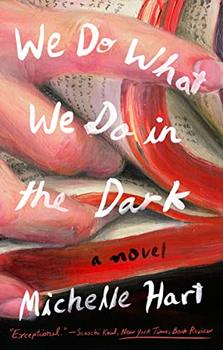Summary | Excerpt | Reading Guide | Reviews | Beyond the Book | Readalikes | Genres & Themes | Author Bio

A Novel
by Michelle HartWhen Mallory was in college, she had an affair with a
woman twice her age. When the woman was seventeen,
she herself had had an affair with a man in his forties. Mallory
admired the woman so much that, for many years, any similarity
between them flattered her.
Mallory had run on the treadmill behind the woman at the
university's gym for weeks before they actually met. It was September
of her freshman year. Mallory, whose mother had died
months before, had become haunted by the prospect of poor
health. Also, she was a first-year student and worried about letting
something free, like a gym membership, go to waste.
The school's main gym was in the midst of renovations; a
crude, makeshift workout area now occupied one half of the
intramural basketball court. This was separated from the other
half by a large mesh curtain. The treadmills and weight-lifting
equipment were laid atop a foundation of cardboard flooring so
as not to scuff the hardwood underneath. It was a squalid, airless
space, almost like a hospital, with nowhere pleasing to look.
Mallory felt drawn to the woman the first time she saw her.
The woman had walked into the gym wearing a loose-fitting
tank top so slack it billowed as she moved. She carried an alluring
sadness about her, with dark pouches under her eyes that seemed
to hold a lot of weariness and wisdom. The woman's facial expression
dramatized the solitude Mallory herself felt inside. The
woman wore it well, and as her shirt lifted from her body, Mallory
saw the woman's melancholy as an invitation, a shared space
for the two of them.
Tied to the woman's wrist was a small, folded towel, and
when the woman stepped onto the treadmill, she unwound it,
draping it over the machine's control panel so the buttons and the
time were hidden. She worked out on her own internal clock,
without headphones, intensely focused and free of distraction. As
the woman ran, Mallory looked from her shoulder blades, which
Mallory's mother had called "wings," to her ass. The woman had
a body that was taut and muscular. It was the kind of body that
seemed like it would never be stricken by illness.
The woman, Mallory learned, went to the gym at the same
time every other day. She ran three miles in twenty-four
minutes. In that period, Mallory could hardly run two, but she found
watching the woman made the time tick heedlessly.
Seeing how fit the woman was, Mallory began to eat healthier.
Instead of a bagel at breakfast, she had a banana or some yogurt.
Instead of a sandwich for lunch, she ate a salad. By the end
of her first month away at school, she'd burned off most of the
baby fat she still carried with her. After eighteen years of avoiding
her reflection, or else being preoccupied by its abject homeliness,
she now stood for long, surreptitious spells in front of the
mirror in the communal bathroom with her shirt hiked up.
The university Mallory attended was on Long Island. The
campus, a forty-five-minute train ride from Manhattan, lay
between two towns—one said to be seedy, the other considered
posh. The bad part had the bars, where some of the students
went on weekends, since they were within walking distance; the
good, which was harder to access without a car, had the manicured
lawns of the professors' homes.
The college was mostly a commuter school, and on nights and
weekends it was as if two-thirds of the students simply vanished,
like the Rapture. Lacking both a car and an interest in bars,
Mallory felt at once claustrophobic and isolated, a feeling with
which she had been familiar for most of her life. She'd hoped
college would be different. Her body vibrated with potential energy.
But walking to and from her classes, she saw the sprawling
campus as indifferent to her. She had the perpetual feeling of
sneezing without being blessed.
Excerpted from We Do What We Do in the Dark by Michelle Hart. Copyright © 2022 by Michelle Hart. Excerpted by permission of Riverhead Books. All rights reserved. No part of this excerpt may be reproduced or reprinted without permission in writing from the publisher.
Idealism increases in direct proportion to one's distance from the problem.
Click Here to find out who said this, as well as discovering other famous literary quotes!
Your guide toexceptional books
BookBrowse seeks out and recommends the best in contemporary fiction and nonfiction—books that not only engage and entertain but also deepen our understanding of ourselves and the world around us.